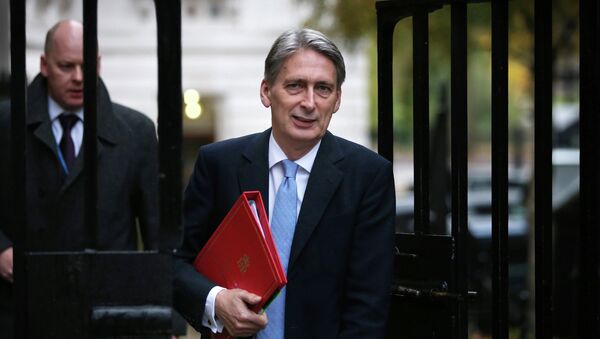MOSCOW, January 22 (Sputnik) – The head of Britain's Foreign Ministry, Philip Hammond, has said in an interview with BBC Radio 4 on Thursday that the country is facing a "very high level of risk" from terrorism, and that the planning of attack by jihadist militants is a "certainty."
"There remains a certainty that planning for attacks is going on" @PHammondMP on security threat to UK #r4today pic.twitter.com/xQz1IeN4hK
— BBC Radio 4 Today (@BBCr4today) 22 января 2015
The politician was speaking before a conference with foreign ministers from 22 countries to discuss the threat from the Islamic State, hosted by Hammond and US Secretary of State John Kerry, who departed Washington on Wednesday evening for the meeting. Kerry told reporters at the airport prior to his departure for London that the actions of terrorists are intended to drive a wedge between those fighting against extremism, "but in fact their actions have had the opposite effect, they're bringing us together with greater determination, with greater resolve to be able to get the job done," the BBC reported.
A senior official from the US Department of State told the BBC that the focus of the conference is the prevention of foreign nationals from traveling to join IS in Iraq and Syria, and to this end "an expert working group" is to be formed to discuss ways of stopping those with extremist sympathies from making their way to the conflict-stricken areas. According to US government figures, more than 16,000 individuals from about 90 countries have traveled to Syria and joined IS since 2012.
On January 13 the head of the European police agency Europol, Rob Wainwright, told the UK Parliament that according to the organization's estimates, "about 3,000 to 5,000 EU nationals" have left Europe to fight in Syria, Iraq and other areas of conflict, EUObserver reported. "We are dealing with a large body of mainly young men that have the potential to come back, and have the intent, if not the capability, to carry out attacks that we have seen in Paris last week," Wainwright told MPs, adding that "The problem that we are dealing with these days is not just about Syria and Iraq. It's also about other conflict zones … in Africa, in the Arab peninsula."
The BBC reported the Foreign Minister as saying on Thursday that the US-led coalition of forces against IS has significantly impeded the expansion of the militants across Iraq and Syria: "The engagement of the coalition and the beginning of air strikes against [IS] positions halted that advance and in some cases it has begun to turn it back," said Hammond, adding that the coalition was also committed to "building the Iraqi security forces from a state of disarray and poor training and poor leadership."
Foreign secretary Philip Hammond tells #r4today it will be months before Iraqi security forces ready to fight #ISIL pic.twitter.com/KR1gQ8486T
— BBC Radio 4 Today (@BBCr4today) 22 января 2015
According to Sky News, Hammond stressed the need for Britain to maintain the fight against IS as part of the fight against terrorism on its own soil. "The defense of our homeland begins by supporting the Iraqi government and the Iraqi people in the fight against ISIL," said the minister, adding that the battle against IS is a long-term undertaking. "This isn't going to be done in three months or six months — it's going to take a year, two years to push ISIL back out of Iraq — but we are doing the things that need to be done in order to turn the tide against ISIL."
The UK's terrorist threat level has been at its "severe" level since August 2014, one stage below the highest level, critical. Such a grading "means that a terrorist attack is highly likely," according to the MI5, the UK Security Service responsible for assessing the level of risk of terrorist attack.


